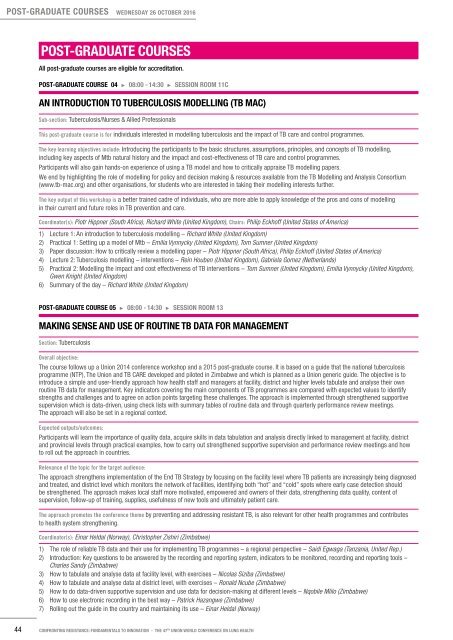TO INNOVATIONS
2f3gIP7
2f3gIP7
You also want an ePaper? Increase the reach of your titles
YUMPU automatically turns print PDFs into web optimized ePapers that Google loves.
POST-GRADUATE COURSES WEDNESDAY 26 OC<strong>TO</strong>BER 2016<br />
POST-GRADUATE COURSES<br />
All post-graduate courses are eligible for accreditation.<br />
POST-GRADUATE COURSE 04 3 08:00 - 14:30 3 SESSION ROOM 11C<br />
AN INTRODUCTION <strong>TO</strong> TUBERCULOSIS MODELLING (TB MAC)<br />
Sub-section: Tuberculosis/Nurses & Allied Professionals<br />
This post-graduate course is for individuals interested in modelling tuberculosis and the impact of TB care and control programmes.<br />
The key learning objectives include: Introducing the participants to the basic structures, assumptions, principles, and concepts of TB modelling,<br />
including key aspects of Mtb natural history and the impact and cost-effectiveness of TB care and control programmes.<br />
Participants will also gain hands-on experience of using a TB model and how to critically appraise TB modelling papers.<br />
We end by highlighting the role of modelling for policy and decision making & resources available from the TB Modelling and Analysis Consortium<br />
(www.tb-mac.org) and other organisations, for students who are interested in taking their modelling interests further.<br />
The key output of this workshop is a better trained cadre of individuals, who are more able to apply knowledge of the pros and cons of modelling<br />
in their current and future roles in TB prevention and care.<br />
Coordinator(s): Piotr Hippner (South Africa), Richard White (United Kingdom), Chairs: Philip Eckhoff (United States of America)<br />
1) Lecture 1: An introduction to tuberculosis modelling – Richard White (United Kingdom)<br />
2) Practical 1: Setting up a model of Mtb – Emilia Vynnycky (United Kingdom), Tom Sumner (United Kingdom)<br />
3) Paper discussion: How to critically review a modelling paper – Piotr Hippner (South Africa), Philip Eckhoff (United States of America)<br />
4) Lecture 2: Tuberculosis modelling – interventions – Rein Houben (United Kingdom), Gabriela Gomez (Netherlands)<br />
5) Practical 2: Modelling the impact and cost effectiveness of TB interventions – Tom Sumner (United Kingdom), Emilia Vynnycky (United Kingdom),<br />
Gwen Knight (United Kingdom)<br />
6) Summary of the day – Richard White (United Kingdom)<br />
POST-GRADUATE COURSE 05 3 08:00 - 14:30 3 SESSION ROOM 13<br />
MAKING SENSE AND USE OF ROUTINE TB DATA FOR MANAGEMENT<br />
Section: Tuberculosis<br />
Overall objective:<br />
The course follows up a Union 2014 conference workshop and a 2015 post-graduate course. It is based on a guide that the national tuberculosis<br />
programme (NTP), The Union and TB CARE developed and piloted in Zimbabwe and which is planned as a Union generic guide. The objective is to<br />
introduce a simple and user-friendly approach how health staff and managers at facility, district and higher levels tabulate and analyse their own<br />
routine TB data for management. Key indicators covering the main components of TB programmes are compared with expected values to identify<br />
strengths and challenges and to agree on action points targeting these challenges. The approach is implemented through strengthened supportive<br />
supervision which is data-driven, using check lists with summary tables of routine data and through quarterly performance review meetings.<br />
The approach will also be set in a regional context.<br />
Expected outputs/outcomes:<br />
Participants will learn the importance of quality data, acquire skills in data tabulation and analysis directly linked to management at facility, district<br />
and provincial levels through practical examples, how to carry out strengthened supportive supervision and performance review meetings and how<br />
to roll out the approach in countries.<br />
Relevance of the topic for the target audience:<br />
The approach strengthens implementation of the End TB Strategy by focusing on the facility level where TB patients are increasingly being diagnosed<br />
and treated, and district level which monitors the network of facilities, identifying both “hot” and “cold” spots where early case detection should<br />
be strengthened. The approach makes local staff more motivated, empowered and owners of their data, strengthening data quality, content of<br />
supervision, follow-up of training, supplies, usefulness of new tools and ultimately patient care.<br />
The approach promotes the conference theme by preventing and addressing resistant TB, is also relevant for other health programmes and contributes<br />
to health system strengthening.<br />
Coordinator(s): Einar Heldal (Norway), Christopher Zishiri (Zimbabwe)<br />
1) The role of reliable TB data and their use for implementing TB programmes – a regional perspective – Saidi Egwaga (Tanzania, United Rep.)<br />
2) Introduction: Key questions to be answered by the recording and reporting system, indicators to be monitored, recording and reporting tools –<br />
Charles Sandy (Zimbabwe)<br />
3) How to tabulate and analyse data at facility level, with exercises – Nicolas Siziba (Zimbabwe)<br />
4) How to tabulate and analyse data at district level, with exercises – Ronald Ncube (Zimbabwe)<br />
5) How to do data-driven supportive supervision and use data for decision-making at different levels – Nqobile Mlilo (Zimbabwe)<br />
6) How to use electronic recording in the best way – Patrick Hazangwe (Zimbabwe)<br />
7) Rolling out the guide in the country and maintaining its use – Einar Heldal (Norway)<br />
44 CONFRONTING RESISTANCE: FUNDAMENTALS <strong>TO</strong> INNOVATION - THE 47 TH UNION WORLD CONFERENCE ON LUNG HEALTH


